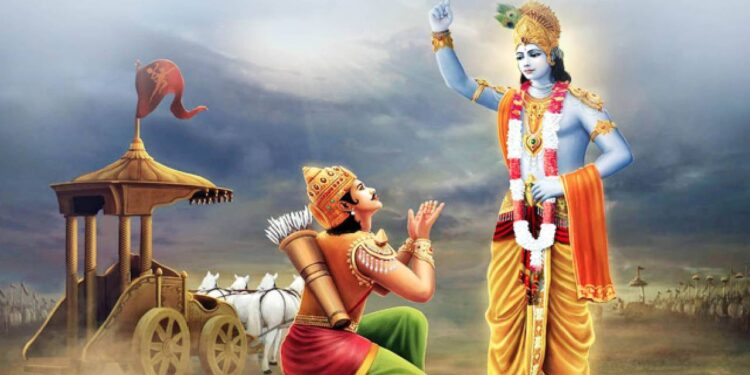Chapter 2 is called Sankhya Yog also called Gyan Yog, Sankhya means knowledge. In this chapter we are trying to learn how to do the right thing. That is called Vivek, the power of discrimination. Before that, the question comes: Who am I? Am I this body? Bhagwad Geeta tells us that I am not this body, I am this Atma. The Atma has a swadharma (right duty).
To re-cap:
“Samatvam Yog ucchyate”. This means “the evenness of mind”.
In spite of trying our best, sometimes we get disturbed. Just like the swing that goes up and down, it also comes to the middle. One side may be happy, other side may not be so happy. When it is in the middle, it is even, it is called Samatwam.
Yogah karmasu kaushalam:
When your mind is at an even state, it is not disturbed. You are fully with that action. The action (karma) does not disturb you. We are bound by Bandhan, which means bondage. Karma binds the mind. We are bound by expectation. Kaushalam means that you are not bound by that action. Karma Kaushalam means that even karma does not bind me, I am free.
Ch 2, shloke 55:
prajahāti yadā kāmān sarvān pārtha mano-gatān
ātmany-evātmanā tuṣhṭaḥ sthita-prajñas tadochyate
Bhagwan said: Arjun, when one thoroughly casts off all cravings of the mind and is satisfied in the Self through the joy of the Self, then he is called stable of mind.
Bhagwan says: if you are greedy, the mind is never stable. But do you really need all the things that you desire? Think of it is need vs greed. Do you need that object, is it essential to your life? Or do you desire it, is it your greed? It is like the chocolate, is it necessary for maintaining good nutrition, or you just want it for its taste? The human mind has a tendency to become greedy very quickly. Like a bottomless cup, you keep pouring milk, but the cup never fills. In order to fill the cup, you have to put a bottom to the cup. Your wish of filling the bottomless cup is greed. How much milk do you need? If you take only one cup of milk, you are satisfied. That is how you put the bottom on the cup. One who is satisfied in himself is able to fulfill his needs.
Chapter 2 Shloke 58:
yadā sanharate chāyaṁ kūrmo ’ṅgānīva sarvaśhaḥ
indriyāṇīndriyārthebhyas tasya prajñā pratiṣhṭhitā
When, like a tortoise that draws in its limbs from all directions, he withdraws all his senses from the sense-objects, his mind becomes steady.
The turtle has four legs and one head. His back is very strong. Whenever there is danger, he pulls his legs and head into his shell, and he becomes very strong, nobody can harm him. Even if an elephant steps on him or a car runs over him, he does not get hurt. Bhagwan says we should be like the turtle. Whenever you think there is something that will disturb your mind, just withdraw into yourself. For example, you have a craving that you must eat a donut. You try to control yourself but find that it is very difficult. You can control yourself by thinking about something else, by withdrawing the senses and not eating it. A turtle is like a self-controlled person, he withdraws into himself. Such a person is called “Sthith pragya” – one who has a stable mind.
Shloke 62:
Read and memorize these in Sanskrit. They have a message that applies to all of us.
dhyāyato viṣhayān puṁsaḥ saṅgas teṣhūpajāyate
saṅgāt sañjāyate kāmaḥ kāmāt krodho ’bhijāyate
The man dwelling on sense-objects develops attachment for them; from attachment springs desire, and from (unfulfilled) desire ensues anger.
An example of a sense object may be a smart phone, or a game, or ice cream, something you are always craving, you constantly think about that thing. When you don’t get that object, your desire is not fulfilled, you get angry. But your expectation that all your desires will get fulfilled is not realistic. Nobody in the world gets all their desires fulfilled.
Suppose anger is a tree. The tree is in the seed, but you don’t see it, because it is in the soil. But when the soil is watered, the tree comes up. Suppose anger is like a tree. The seed of anger is in the object. Maybe the object is a bike. The seed is in the bike. You want a bike; you are always thinking of the bike. If you don’t get it, you get angry, sad or agitated. Sadness or agitation is similar to anger, it causes you to be upset.
Shloke 63:
krodhād bhavati sammohaḥ sammohāt smṛiti-vibhramaḥ
smṛiti-bhranśhād buddhi-nāśho buddhi-nāśhāt praṇaśhyati
From anger arises delusion; from delusion, confusion of memory; from confusion of memory, loss of reason; and from loss of reason one goes to complete ruin.
When we are angry, we are not in our right mind, we are cannot think rationally. The mind is clouded. When we are angry, we forget to behave properly, we may lose control of our actions or thoughts. That is delusion. From delusion arises loss of memory. When memory is lost, logic and intellect is not working properly. Our judgement may become clouded. We lose our ability to reason properly. Then we forget the purpose of what we were doing. We forget our goal. Similarly in life, I cannot help others when I am angry. In order to help others, I need to be able to remain calm. I need to have a positive mindset.
Let us look at a diagram.
That is the ladder of decline. It shows the path of decline, how one negative thought can lead to downfall. We have to be careful, otherwise we will lose our focus.
Bhagwan gives us the solution. He shows us how to stop falling down from this ladder. That is our goal. These 2 shloke’s show exactly what happens.
Shloke 64:
rāga-dveṣha-viyuktais tu viṣhayān indriyaiśh charan
ātma-vaśhyair-vidheyātmā prasādam adhigachchhati
But the self-controlled Sadhak, while enjoying the various sense-objects through his senses, which are disciplined and free from likes and dislikes, attains placidity of mind.
Bhagwan says you should have objects, like a car, a toy etc, you may have them and enjoy them. The difference between the ordinary person and the self-controlled person is that the self-controlled person still enjoys the objects, but he does not have likes and dislikes. He is able to detach himself from the object. Just like you are able to put it away when you are done playing with the toy, not thinking about it all the time. That should be our attitude, our way of living.
Shloke 70:
āpūryamāṇam achala-pratiṣhṭhaṁ, samudram āpaḥ praviśhanti yadvat
tadvat kāmā yaṁ praviśhanti sarve, sa śhāntim āpnoti na kāma-kāmī
As the waters of different rivers enter the ocean, which though full on all sides, remains undisturbed; likewise, he in whom all enjoyments merge themselves without causing disturbance attains peace; not he who hankers after such enjoyments.
Bhagwan is giving us a metaphor. All the rivers enter an ocean. The waters from the ocean evaporate and become a cloud, then the cloud becomes rain. Rain falls on the mountain and becomes a river. This is a cycle. But since the ocean is very deep, it is undisturbed when the rivers enter it. Similarly, the person who is a practitioner of Bhagwad Geeta enjoys everything but doesn’t get disturbed. Just like in a ball game, if some players are disturbed, and then they may lose the game. If someone says something about us, should we let our mind get disturbed? No, we should remain calm and undisturbed like the ocean, which is very deep. How do we become undisturbed like the ocean? By doing Gayatri Mantra japa, by reading Bhagwad Geeta.
What is the purpose of life? To be balanced, happy and peaceful, to have an undisturbed mind, like the ocean.




![[ India Today ] Ohio senator JD Vance thanks wife, a Hindu, for helping him find Christian faith](https://hinduvishwa.org/wp-content/uploads/2024/06/us-senator-jd-vance-reveals-how-his-hindu-wife-usha-helped-him-find-his-christian-faith-image-re-272530504-16x9_0-120x86.webp)










